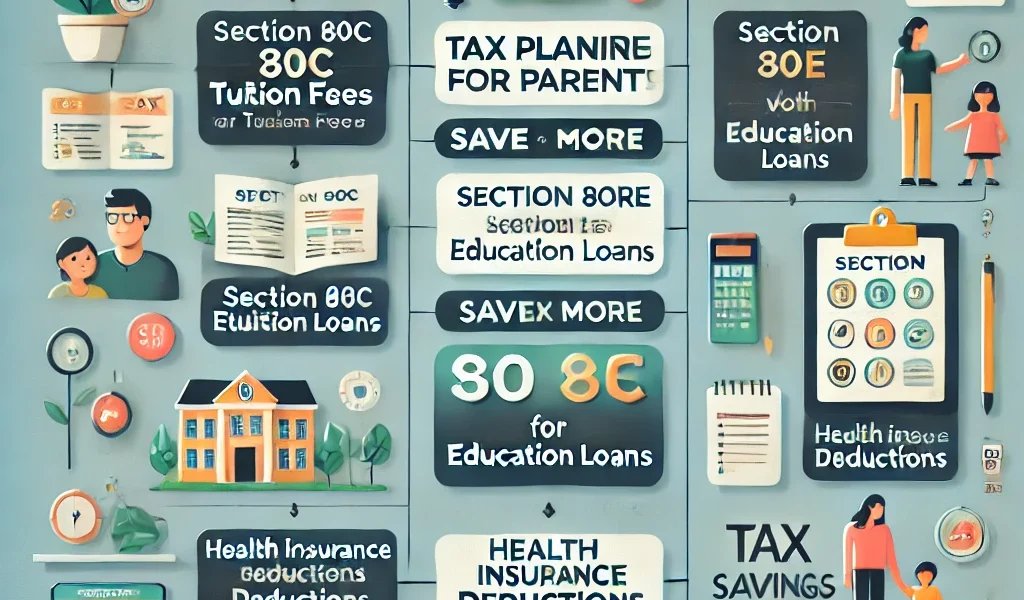Tax planning is an essential aspect of financial management, especially for parents who bear the responsibility of their child’s education and other related expenses. By utilizing the right tax-saving strategies, parents can optimize their tax liabilities while ensuring a secure future for their children. This guide will explore various tax benefits, deductions, and smart financial moves that parents can use to save more on child education and expenses.
Understanding Tax Benefits for Parents
The Indian Income Tax Act provides multiple provisions under which parents can claim deductions and exemptions related to child education, healthcare, and investments. Knowing these tax benefits can help parents reduce their overall tax burden.
1. Tax Deductions on Tuition Fees (Section 80C)
Parents can claim deductions under Section 80C for tuition fees paid to a school, college, university, or any other educational institution in India.
- Deduction Limit: Up to ₹1.5 lakh per year (part of the total 80C limit).
- Eligible Institutions: Recognized schools, colleges, and universities in India.
- Eligible Parents: Either parent can claim the deduction if they are paying the fees.
- Number of Children Covered: Deductions can be claimed for up to two children.
What’s Not Covered?
- Tuition fees for private coaching or tuition centers.
- Donations or development fees paid to schools.
- Hostel, transport, or other miscellaneous fees.
2. Education Loan Interest Deduction (Section 80E)
If a parent takes an education loan for their child’s higher education, they can claim tax benefits under Section 80E.
- Deduction Limit: No upper limit (entire interest paid is deductible).
- Duration: Deduction is available for 8 consecutive years or until the loan is fully repaid, whichever is earlier.
- Eligible Courses: Higher education courses in India and abroad.
- Who Can Claim?: Only the person who has taken the loan (parent or student) can claim the benefit.
3. Deduction for Health Insurance Premiums (Section 80D)
Parents can claim tax deductions on health insurance premiums paid for their children under Section 80D.
- Deduction Limit: Up to ₹25,000 per year for premiums paid for self, spouse, and dependent children.
- If Parents are Senior Citizens: The limit increases to ₹50,000.
4. Exemptions on Scholarships and Grants
If your child receives a scholarship or grant for their education, it is fully exempt from tax under Section 10(16) of the Income Tax Act.
5. Investing in Child’s Future for Tax Benefits
There are several investment options that can help parents secure their child’s future while offering tax benefits:
a. Sukanya Samriddhi Yojana (SSY) – Section 80C
- A government-backed savings scheme for a girl child.
- Tax Benefit: Deposits up to ₹1.5 lakh per year are tax-deductible under Section 80C.
- Tax-Free Maturity: Interest and maturity amount are tax-free.
- Who Can Invest?: Parents or legal guardians of a girl child below 10 years.
b. Public Provident Fund (PPF) – Section 80C
- Long-term investment option with tax-free interest.
- Tax Benefit: Deposits up to ₹1.5 lakh per year are eligible for deduction.
- Lock-in Period: 15 years.
c. Child Insurance Plans
- Provides financial security in case of unfortunate events.
- Premiums paid are eligible for deduction under Section 80C.
- Maturity proceeds are tax-free under Section 10(10D).
6. Tax Benefits on Dependent Child Allowance
Salaried employees can claim tax exemption on Dependent Child Allowance as per the Income Tax Act:
- Allowance Amount: ₹100 per month per child (up to 2 children).
- Hostel Expenditure Allowance: Additional exemption of ₹300 per month per child (up to 2 children).
7. How to Claim Tax Benefits on Child Education?
Documents Required:
- Fee receipts from the educational institution.
- Loan documents and interest certificates from banks for education loans.
- Medical insurance premium receipts.
- Investment proof for tax-saving schemes.
Steps to Claim:
- Keep all necessary documents handy before filing your Income Tax Return (ITR).
- Choose the correct ITR form based on your income type.
- Mention all eligible deductions under relevant sections.
- Ensure that the payments are made through legal banking channels.
8. Common Mistakes to Avoid
- Forgetting to claim deductions under Section 80C for tuition fees.
- Not maintaining proper documentation.
- Assuming that all education-related expenses are tax-deductible.
- Missing deadlines for investment in tax-saving instruments.
Conclusion
Effective tax planning can help parents reduce their tax liabilities while securing their child’s future. By utilizing provisions such as Section 80C, 80E, and 80D, parents can save significantly on education and healthcare expenses. Strategic investments in SSY, PPF, and child insurance plans can further enhance tax savings. Always maintain proper records and consult a tax expert if needed to maximize benefits without legal complications.




